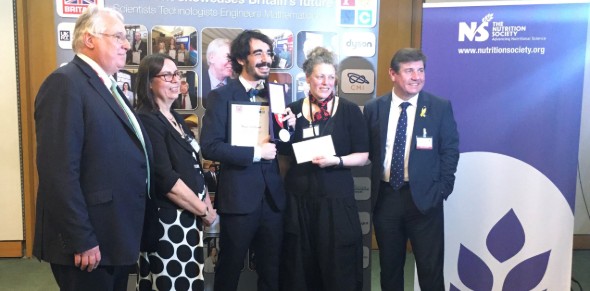News
UK bioscience research impresses MPs at STEM for Britain
- Details
- 09 March 2022
Research on how the early signs of disease can be detected from patients' breathing patterns has won the annual STEM for Britain poster competition at the Houses of Parliament.
Early-career research scientists, engineers, technologists and mathematicians presented their work to dozens of politicians and a panel of expert judges as part of the competition on Monday 7th March.
Miquel Serna Pascual, a PhD student at King’s College London, won Gold in the Biological and Biomedical Sciences category for his presentation “Hidden disease signs in the pattern of breathing”. His research uses deep learning to uncover clues about respiratory function and disease progression in breathing waveforms. These waveforms are regularly recorded in hospital settings but are generally only used to monitor simple metrics like breathing rate.
Hamish Symington from the University of Cambridge took silver for his poster ‘Improving flowers to help feed the world’ and Claire Laxton from the University of Nottingham took bronze with her presentation of an artificial wound infection model to better understand nutrient scavenging in Pseudomonas aeruginosa.
 Miquel Serna Pascual (centre) receives gold at the annual STEM for Britain event held at the Houses of Parliament.
Miquel Serna Pascual (centre) receives gold at the annual STEM for Britain event held at the Houses of Parliament.
The winners receive prizes of £1,500, £1,000 and £750 respectively. Prizes were also awarded in categories for chemistry, engineering, mathematical sciences and physics. The Westminster Medal, awarded to the overall winner, went to physicist Adele Parry for her poster 'A better lateral flow test? the design of novel liquid crystal droplet biosensors.'
STEM for Britain aims to help politicians understand more about the UK’s science and engineering base and rewards some of the strongest scientific and engineering research being undertaken in the UK.
Professor Claire Wathes CBiol FRSB, speaking at the event on behalf of the RSB, said the competition had gone from strength to strength since its inception 25 years ago and that the 2022 event fully lived up to expectations.
“Current issues such as global warming, food security and the COVID pandemic have really highlighted just how important the biosciences are”, said Wathes. “In order for science policy to be rooted in sound evidence, then it is vital that ongoing research and its implications are communicated clearly to both the public and policymakers, particularly here in Parliament.”
Stephen Metcalfe MP, Chair of the Parliamentary & Scientific Committee, said the competition is an important date in the parliamentary calendar, giving MPs an opportunity to speak to a wide range of the country’s best young researchers.
“These early career engineers, mathematicians and scientists are the architects of our future and STEM for Britain is politicians’ best opportunity to meet them and understand their work.”
- More information about STEM for Britain and downloadable posters from all the shortlisted researchers can be found here.
STEM for Britain is run by the Parliamentary and Scientific Committee in collaboration with the Royal Academy of Engineering, the Royal Society of Chemistry, the Institute of Physics, the Royal Society of Biology, The Physiological Society and the Council for the Mathematical Sciences, with financial support from Dyson, Clay Mathematics Institute, UKRI, Society of Chemical Industry, the Nutrition Society, Institute of Biomedical Science, the Heilbronn Institute for Mathematical Research, the Biochemical Society and IEEE UK & Ireland Section.

